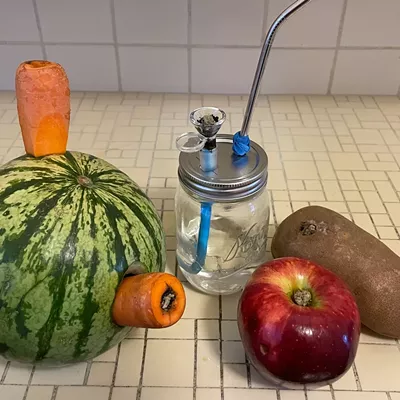So you've had your potential new home inspected. Or perhaps it's your old home, and you want to know just how good its condition is before you list it. Well, it turns out the flooded basement you call an "indoor pool" isn't exactly kosher, and neither is the gaping hole in your roof you call a "skylight." To top it off, you just learned there's a sentient mold growing in your ceiling that calls itself Jessica. Hmm.
Fortunately for you, your home inspection isn't necessarily a pass or fail thing, says Aaron Storer, an inspector and co-owner of Golden Star Home Inspections in Spokane. It helps buyers negotiate prices and sellers find out what they need to fix before listing.
"Getting your home inspected is your chance during the buying process to get a third-party, unbiased opinion on your property," Storer says.
But just how much of this work will you need to do yourself? What is best left to the professionals, and what can you save a little money on by rolling up your sleeves and DIYing?
We spoke to a handful of local home professionals about the most common issues they see.
ROOFING
"As a homeowner, there are two things you're fighting: gravity and moisture," Storer says. "If you can hold those two things back, your home will be in great shape most of the time."Roofing can seem simple enough, but it is one of the most important defenses against gravity and moisture for your home. That one shingle that fell off your home during a storm last year can create the smallest opening for rainfall or snow. That tiny bit of moisture can slip into your home and turn into a major mold problem if left unchecked, he says. Most roofs only last a few decades at most.
Storer, a DIYer himself, says this is one task that you want done right, and having a professional do it for you should give you some peace of mind.
ELECTRICAL WIRING
Another common home inspection issue is electrical. You can find a lot of older homes in Spokane with outdated electrical wiring, says Greg Kappus, a Spokane electrician and real estate agent. You can also find a lot of loose connections from shoddy DIY work, commonly found in recently "flipped" homes, he says.The loose connections he's referring to are commonly found in DIY projects where the electricity functions, but the wires are not properly fastened inside of a box. A connection that becomes loose — either over time or due to poor craftsmanship — becomes hot, says Kappus, who has been working as an electrician for nearly 45 years.
"I've seen wires completely melt the insulation up the wall of the house," Kappus says. "A loose connection over time will start sparking and arcing. Arc flashes can be tremendously hot. It melts the wire nuts. It melts the insulation and receptacle."
He recommends people put in the time and energy to learn basic electrical skills, considering how expensive fixes can sometimes be. However, he also recommends that DIYers get a second opinion on their handiwork from a city inspector before calling it a day.
"120 volts is your basic house wiring," Kappus says. "Anything over 120 volts can get seriously dangerous if you're not knowing what you're doing."
HEATING, VENTILATION, AIR CONDITIONING
A common issue across the board for home inspectors is what's known as HVAC — heating, ventilation and air conditioning. It's one of the biggest things home inspector Keith Robertson says doesn't get regularly serviced in many Inland Northwest homes.You'll want to hire an HVAC technician for this, not your "dad, uncle or brother," says Robertson, owner of Pillar to Post Home Inspectors in Spokane. "They check the flow rate, the air-gas mixture. They make sure all of those settings are correct because they can get out of adjustment."
Along with providing proper comfort in the home, a home with a properly functioning HVAC system also prevents moisture and mold from growing indoors.
HVAC technicians can also do a service or cleaning on your furnace or air conditioning unit, says Spokane Realtor Marie Pence. She estimates that about 90 percent of home inspections will come back with potential buyers requesting a service or cleaning on an HVAC system anyway.
FOUNDATION
Another common issue that can be easily addressed without the help of a professional is some light foundation work, says Robertson, of Pillar to Post. It's not always as complicated and expensive as jacking up the house and repouring concrete. Handy DIYers can easily prevent major issues with a few bucks at the hardware store and a little bit of landscaping.Flooding basements can often be repaired by grading the terrain outside of the home so rainwater drains away from the home and by installing or repairing gutters, he says.
Faulty gutters are one of the biggest items that come up on home inspections, Realtor Pence says. Also, be mindful of "wood-to-earth" contact. "Make sure any of your wood siding at the basement of the home isn't in contact with the earth because it just eats away at it," she says.
Cracks in the concrete can also be repaired easily with some concrete caulk, Robertson adds.
"If you're gonna do it yourself, do it right."
SHOULD I DIY?
Fixing any of the above issues is all about finding your comfort level, Golden Star's Storer says. Depending on your skill and comfort level, you can take care of most home inspection issues yourself after watching some detailed internet tutorials, he says.Of course, this isn't recommended for everything, and most serious home repairs by professionals include warranties on their service.
"If you're gonna do it yourself, do it right," says realtor Price. "In this market, people are paying more because they are pickier."
A lot of people think they know what they're doing, she adds, "and you can see it when you go into those homes." Do it wrong, "and it will come back to bite you in the ass." ♦

























